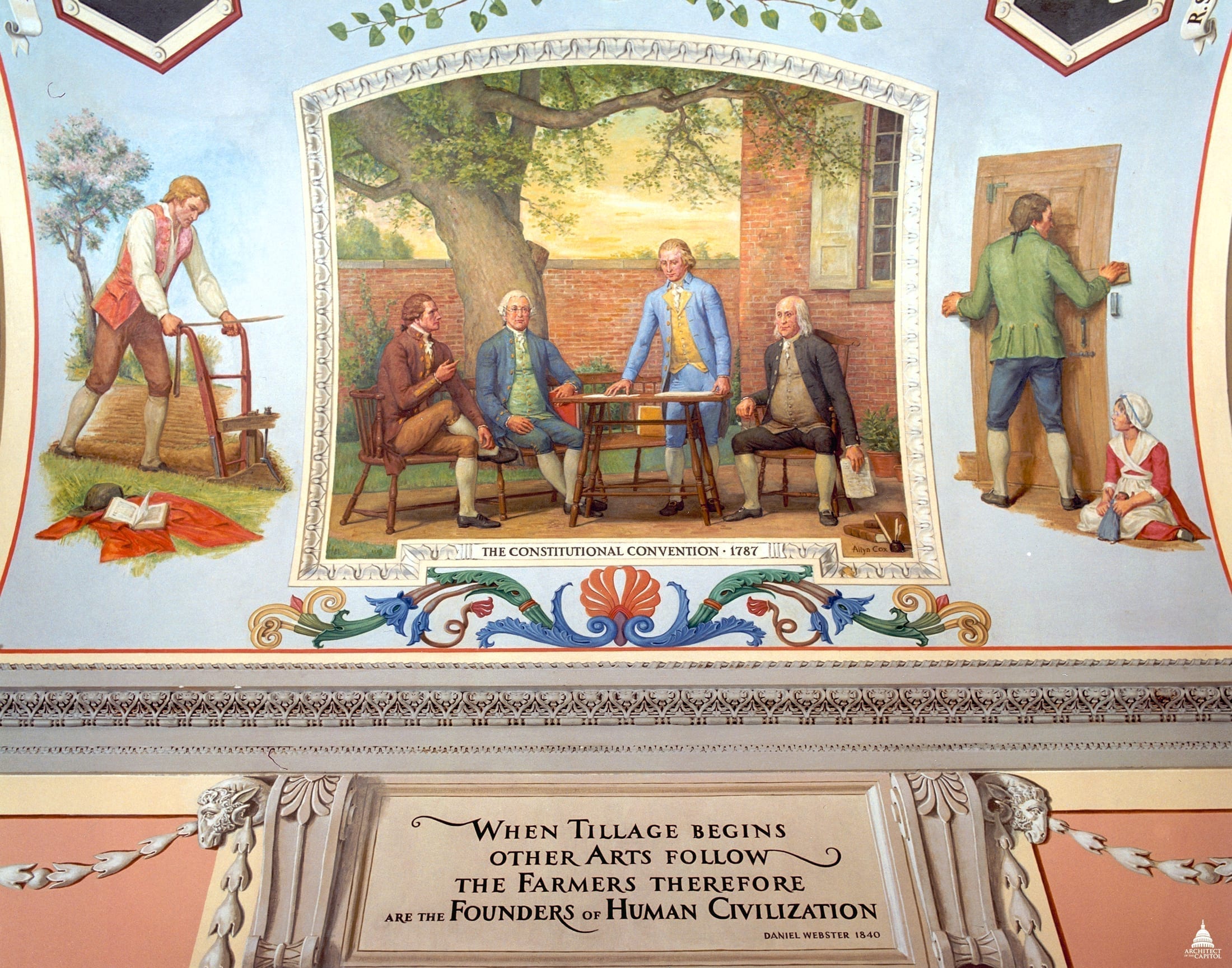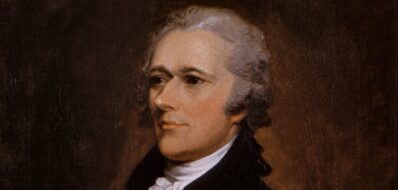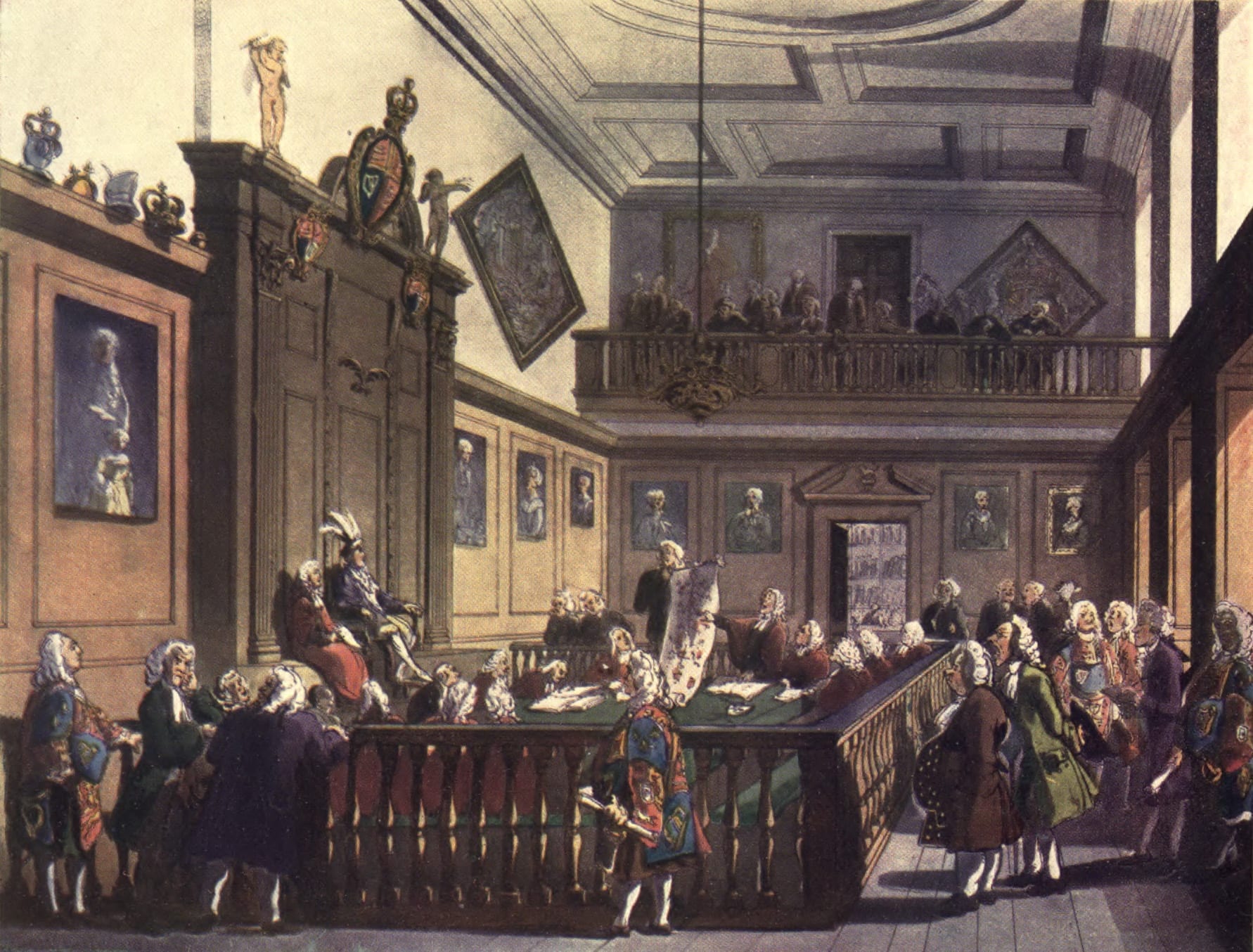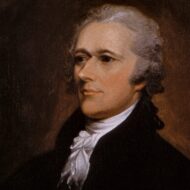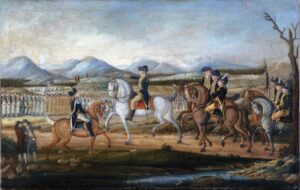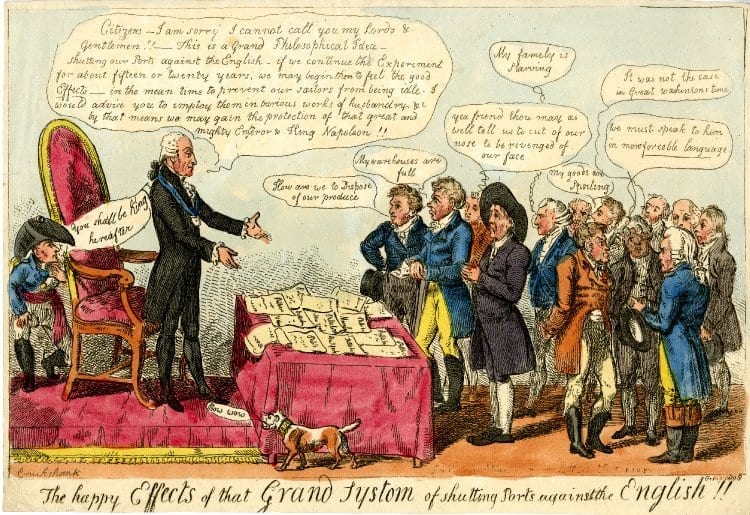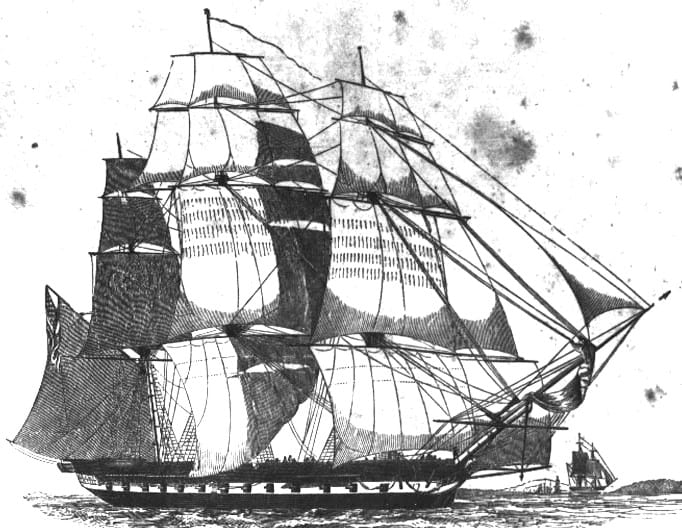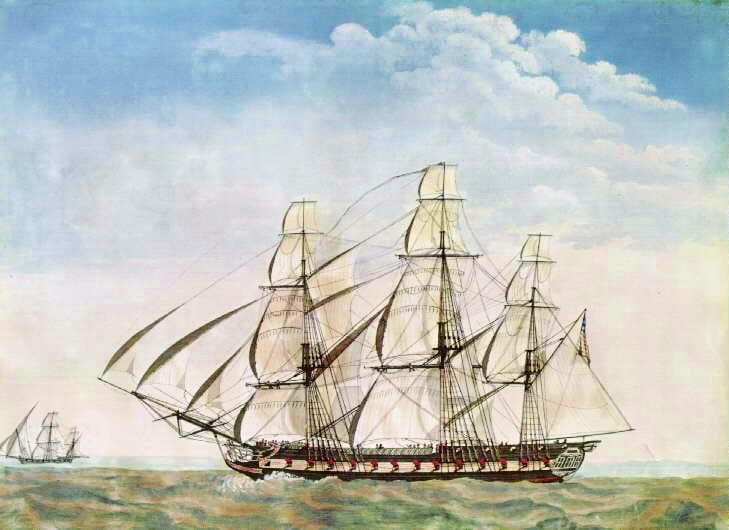
No study questions
No related resources
Introduction
The trade embargoes put into place by Presidents Thomas Jefferson and James Madison in an effort to keep the United States out of the Napoleonic Wars between France and Britain were particularly unpopular with the largely mercantile population of the New England states whose economic vitality depended largely upon international commerce. Madison’s decision to declare war on Great Britain in June 1812, although intended as a defense of American shipping and sailors being targeted by British warships, was similarly unpopular in the region. Indeed, the governors of the New England states largely refused Madison’s request to nationalize the state militia, on the grounds that it was an unconstitutional imposition on their right to defend their own borders and interests. Madison’s subsequent failure to prevent the British from blockading New England’s ports only exacerbated the political tensions.
By late 1814, the situation had become so dire that a group of wealthy New England Federalists, led by Joseph Lyman, and others from Massachusetts felt justified in enjoining their state legislatures to call a regional convention to organize a formal protest of the administration’s war policy. Held in Hartford, Connecticut, from December 15, 1814 – January 5, 1815, the convention garnered significant attention both prior to and during its sessions. To many observers, the convention seemed poised on the very edge of treason, as in the cartoon by William Charles, which depicts representatives of Massachusetts, Connecticut, and Rhode Island (the three New England States who dominated the Hartford Convention) poised on the edge of a cliff, indecisively looking toward the open arms of England’s King George III.
The delegates to the convention held their meetings in such complete secrecy that no record of any speeches given or motions discussed on the floor survives. At the conclusion of their gathering, they did pass a series of resolutions that they intended to present to Congress in the spring of 1815. The urgency of the convention’s concerns was dissipated, however, when news reached the United States that the Treaty of Ghent ending the war had been signed in late December 1814. Their agenda rapidly faded into relative oblivion, to be remembered primarily as a specter of the dangers of rampant regionalism.
Public Documents, Containing Proceedings of the Hartford Convention of Delegates . . . (Massachusetts Senate: 1815), 3-22.
The Delegates from the Legislatures of the States of Massachusetts, Connecticut, and Rhode-Island, and from the Counties of Grafton and Cheshire in the State of New-Hampshire and the County of Windham in the State of Vermont, assembled in Convention, beg leave to report the following result of their conference.
The Convention is deeply impressed with a sense of the arduous nature of the commission which they were appointed to execute, of devising the means of defense against dangers, and of relief from oppressions proceeding from the act of their own Government, without violating constitutional principles, or disappointing the hopes of a suffering and injured people. To prescribe patience and firmness to those who are already exhausted by distress, is sometimes to drive them to despair, and the progress towards reform by the regular road, is irksome to those whose imaginations discern, and whose feelings prompt, to a shorter course. But when abuses, reduced to system and accumulated through a course of years have pervaded every department of Government, and spread corruption through every region of the State; when these are clothed with the forms of law, and enforced by an Executive whose will is their source, no summary means of relief can be applied without recourse to direct and open resistance. This experiment, even when justifiable, cannot fail to be painful to the good citizen; and the success of the effort will be no security against the danger of the example. Precedents of resistance to the worst administration, are eagerly seized by those who are naturally hostile to the best. Necessity alone can sanction a resort to this measure; and it should never be extended in duration or degree beyond the exigency, until the people, not merely in the fervor of sudden excitement, but after full deliberation, are determined to change the Constitution.
It is a truth, not to be concealed, that a sentiment prevails to no inconsiderable extent, that Administration have given such constructions to that instrument, and practiced so many abuses under color of its authority, that the time for a change is at hand. Those who so believe, regard the evils which surround them as intrinsic and incurable defects in the Constitution. They yield to a persuasion, that no change, at any time, or on any occasion, can aggravate the misery of their country. This opinion may ultimately prove to be correct. But as the evidence on which it rests is not yet conclusive, and as measures adopted upon the assumption of its certainty might be irrevocable, some general considerations are submitted, in the hope of reconciling all to a course of moderation and firmness, which may save them from the regret incident to sudden decisions, probably avert the evil, or at least insure consolation and success in the last resort.
The Constitution of the United States, under the auspices of a wise and virtuous Administration, proved itself competent to all the objects of national prosperity, comprehended in the views of its framers. No parallel can be found in history, of a transition so rapid as that of the United States from the lowest depression to the highest felicity – from the condition of weak and disjointed republics, to that of a great, united, and prosperous nation.
Although this high state of public happiness has undergone a miserable and afflicting reverse, through the prevalence of a weak and profligate policy, yet the evils and afflictions which have thus been induced upon the country, are not peculiar to any form of Government. The lust and caprice of power, the corruption of patronage, the oppression of the weaker interests of the community by the stronger, heavy taxes, wasteful expenditures, and unjust and ruinous wars, are the natural offspring of bad Administrations, in all ages and countries. It was indeed to be hoped, that the rulers of these States would not make such disastrous haste to involve their infancy in the embarrassments of old and rotten institutions. Yet all this have they done; and their conduct calls loudly for their dismission and disgrace. But to attempt upon every abuse of power to change the Constitution, would be to perpetuate the evils of revolution. . . .
Finally, if the Union be destined to dissolution, by reason of the multiplied abuses of bad administrations, it should, if possible, be the work of peaceable times, and deliberate consent. – Some new form of confederacy should be substituted among those States, which shall intend to maintain a federal relation to each other. – Events may prove that the causes of our calamities are deep and permanent. They may be found to proceed, not merely from the blindness of prejudice, pride of opinion, violence of party spirit, or the confusion of the times; but they may be traced to implacable combinations of individuals, or of States, to monopolize power and office, and to trample without remorse upon the rights and interests of commercial sections of the Union. Whenever it shall appear that these causes are radical and permanent, a separation by equitable arrangement, will be preferable to an alliance by constraint, among nominal friends, but real enemies, inflamed by mutual hatred and jealousy, and inviting by intestine divisions, contempt, and aggression from abroad. But a severance of the Union by one or more States, against the will of the rest, and especially in a time of war, can be justified only by absolute necessity. These are among the principal objections against precipitate measures tending to disunite the States, and when examined in connection with the farewell address of the Father of his country, they must, it is believed, be deemed conclusive. . . .
That acts of Congress in violation of the Constitution are absolutely void, is an undeniable position. It does not, however, consist with the respect and forbearance due from a confederate state towards the General Government, to fly to open resistance upon every infraction of the Constitution. The mode and the energy of the opposition, should always conform to the nature of the violation, the intention of its authors, the extent of the injury inflicted, the determination manifested to persist in it, and the danger of delay. But in cases of deliberate, dangerous, and palpable infractions of the Constitution, affecting the sovereignty of a State, and liberties of the people; it is not only the right but the duty of such a State to interpose its authority for their protection, in the manner best calculated to secure that end. When emergencies occur, which are either beyond the reach of the judicial tribunals, or too pressing to admit of the delay incident to their forms, states, which have no common umpire, must be their own judges, and execute their own decisions. It will thus be proper for the several states to await the ultimate disposal of the obnoxious measures, recommended by the Secretary of War, or pending before Congress, and so to use their power according to the character these measures shall finally assume, as effectually to protect their own sovereignty, and the rights and liberties of their citizens. . . .
The last inquiry, what course of conduct ought to be adopted by the aggrieved states, is in a high degree momentous. When a great and brave people shall feel themselves deserted by their Government, and reduced to the necessity either of submission to a foreign enemy, or of appropriating to their own use, those means of defense which are indispensable to self-preservation, they cannot consent to wait passive spectators of approaching ruin, which it is in their power to avert, and to resign the last remnant of their industrious earnings, to be dissipated in support of measures destructive of the best interests of the nation.
This Convention will not trust themselves to express their conviction of the catastrophe to which such a state of things inevitably tends. Conscious of their high responsibility to God and their country, solicitous for the continuance of the Union, as well as the sovereignty of the states, unwilling to furnish obstacles to peace – resolute never to submit to a foreign enemy, and confiding in the Divine care and protection, they will, until the last hope shall be extinguished, endeavor to avert such consequences. . . .
[T]he duty incumbent on this Convention will not have been performed, without exhibiting some general view of such measures as they deem essential to secure the nation against a relapse into difficulties and dangers, should they, by the blessing of Providence, escape from their present condition, without absolute ruin. . . .
To investigate and explain the means whereby this fatal reverse has been effected, would require a voluminous discussion. Nothing more can be attempted in this Report, than a general allusion to the principal outlines of the policy which has produced this vicissitude. Among these may be enumerated
First. – A deliberate and extensive system for effecting a combination among certain states, by exciting local jealousies and ambition, so as to secure to popular leaders in one section of the Union, the controul of public affairs in perpetual succession. To which primary object most other characteristics of the system may be reconciled.
Secondly. – The political intolerance displayed and avowed, in excluding from office men of unexceptionable merit, for want of adherence to the executive creed.
Thirdly. – The infraction of the judiciary authority and rights, by depriving judges of their offices in violation of the Constitution.
Fourthly. – The abolition of existing taxes, requisite to prepare the Country for those changes to which nations are always exposed, with a view to the acquisition of popular favour.
Fifthly. – The influence of patronage in the distribution of offices, which in these States has been almost invariably made among men the least entitled to such distinction, and who have sold themselves as ready instruments for distracting public opinion, and encouraging administration to hold in contempt the wishes and remonstrances of a people thus apparently divided.
Sixthly. – The admission of new States into the Union, formed at pleasure in the western region, has destroyed the balance of power which existed among the original States, and deeply affected their interest.
Seventhly. – The easy admission of naturalized foreigners, to places of trust, honour or profit, operating as an inducement to the malcontent subjects of the old world to come to these States, in quest of executive patronage, and to repay it by an abject devotion to executive measures.
Eighthly. – Hostility to Great-Britain, and partiality to the late government of France, adopted as coincident with popular prejudice, and subservient to the main object, party power. Connected with these must be ranked erroneous and distorted estimates of the power and resources of those nations, of the probable results of their controversies, and of our political relations to them respectively.
Lastly and principally. – A visionary and superficial theory in regard to commerce, accompanied by a real hatred but a feigned regard to its interests, and a ruinous perseverance in efforts to render it an instrument of coercion and war.
But it is not conceivable that the obliquity of any administration could, in so short a period, have so nearly consummated the work of national ruin, unless favored by defects in the Constitution.
To enumerate all the improvements of which that instrument is susceptible, and to propose such amendments as might render it in all respects perfect, would be a task, which this Convention has not thought proper to assume. – They have confined their attention to such as experience has demonstrated to be essential, and even among these, some are considered entitled to a more serious attention than others. They are suggested without any intentional disrespect to other States, and are meant to be such as all shall find an interest in promoting. Their object is to strengthen, and if possible to perpetuate, the Union of the States, by removing the grounds of existing jealousies, and providing for a fair and equal representation and a limitation of powers, which have been misused.
The first amendment proposed, relates to the apportionment of Representatives among the slave holding States. This cannot be claimed as a right. Those States are entitled to the slave representation, by a constitutional compact. It is therefore merely a subject of agreement, which should be conducted upon principles of mutual interest and accommodation, and upon which no sensibility on either side should be permitted to exist. It has proved unjust and unequal in its operation. . . .
The next amendment relates to the admission of new States into the union.
. . . The object is merely to restrain the constitutional power of Congress in admitting new states. At the adoption of the Constitution, a certain balance of power among the original parties was considered to exist, and there was at that time, and yet is among those parties, a strong affinity between their great and general interests. – By the admission of these States that balance has been materially affected, and unless the practice be modified, must ultimately be destroyed. . . .
The next amendments proposed by the Convention, relate to the powers of Congress, in relation to Embargo and the interdiction of commerce.
Whatever theories upon the subject of commerce, have hitherto divided the opinions of statesmen, experience has at last shewn that it is a vital interest in the United States, and that its success is essential to the encouragement of agriculture and manufactures, and to the wealth, finances, defense, and liberty of the nation. Its welfare can never interfere with the other great interests of the State, but must promote and uphold them. Still those who are immediately concerned in the prosecution of commerce, will of necessity be always a minority of the nation.
. . . [T]hey are entirely unable to protect themselves against the sudden and injudicious decisions of bare majorities, and the mistaken or oppressive projects of those who are not actively concerned in its pursuits. Of consequence, this interest is always exposed to be harassed, interrupted, and entirely destroyed, upon pretense of securing other interests. Had the merchants of this nation been permitted, by their own government, to pursue an innocent and lawful commerce, how different would have been the state of the treasury and of public credit! . . . No union can be durably cemented, in which every great interest does not find itself reasonably secured against the encroachment and combinations of other interests. When, therefore, the past system of embargoes and commercial restrictions shall have been reviewed . . . the reasonableness of some restrictions upon the power of a bare majority to repeat these oppressions, will appear to be obvious.
The next amendment proposes to restrict the power of making offensive war. In the consideration of this amendment, it is not necessary to inquire into the justice of the present war. But one sentiment now exists in relation to its expediency, and regret for its declaration is nearly universal. . . . In this case, as in the former, those more immediately exposed to its fatal effects are a minority of the nation. The commercial towns, the shores of our seas and rivers, contain the population, whose vital interests are most vulnerable by a foreign enemy. Agriculture, indeed, must feel at last, but this appeal to its sensibility comes too late. Again, the immense population which has swarmed into the West, remote from immediate danger, and which is constantly augmenting, will not be averse from [insulated from] the occasional disturbances of the Atlantic States. Thus interest may not unfrequently combine with passion and intrigue, to plunge the nation into needless wars, and compel it to become a military, rather than a happy and flourishing people. These considerations which it would be easy to augment, call loudly for the limitation proposed in the amendment.
Another amendment, subordinate in importance, but still in a high degree expedient, relates to the exclusion of foreigners, hereafter arriving in the United States, from the capacity of holding offices of trust, honour or profit.
. . . [W]hy admit to a participation in the government aliens who were no parties to the compact – who are ignorant of the nature of our institutions, and have no stake in the welfare of the country, but what is recent and transitory? It is surely a privilege sufficient, to admit them after due probation to become citizens, for all but political purposes. . . .
The last amendment respects the limitation of the office of President, to a single constitutional term, and his eligibility from the same state two terms in succession.
Upon this topic, it is superfluous to dilate. The love of power is a principle in the human heart which too often impels to the use of all practicable means to prolong its duration. The office of President has charms and attractions which operate as powerful incentives to this passion. The first and most natural exertion of a vast patronage is directed towards the security of a new election. The interest of the country, the welfare of the people, even honest fame and respect for the opinion of posterity, are secondary considerations. All the engines of intrigue; all the means of corruption, are likely to be employed for this object. A President whose political career is limited to a single election, may find no other interest than will be promoted by making it glorious to himself, and beneficial to his country. But the hope of reelection is prolific of temptations, under which these magnanimous motives are deprived of their principal force. . . .
Such is the general view which this Convention has thought proper to submit, of the situation of these States, of their dangers and their duties. . . . The peculiar difficulty and delicacy of performing, even this undertaking, will be appreciated by all who think seriously upon the crisis. Negotiations for Peace, are at this hour supposed to be pending, the issue of which must be deeply interesting to all. No measures should be adopted, which might unfavorably affect that issue; none which should embarrass the Administration, if their professed desire for peace is sincere; and none, which on supposition of their insincerity, should afford them pretexts for prolonging the war, or relieving themselves from the responsibility of a dishonorable peace. It is also devoutly to be wished, that an occasion may be afforded to all friends of the country, of all parties, and in all places, to pause and consider the awful state to which pernicious counsels, and blind passions, have brought this people. The number of those who perceive, and who are ready to retrace errors, must it is believed be yet sufficient to redeem the nation. It is necessary to rally and unite them by the assurance that no hostility to the Constitution is meditated, and to obtain their aid, in placing it under guardians, who alone can save it from destruction. Should this fortunate change be effected, the hope of happiness and honor may once more dispel the surrounding gloom. Our nation may yet be great, our union durable. But should this prospect be utterly hopeless, the time will not have been lost, which shall have ripened a general sentiment of the necessity of more mighty efforts to rescue from ruin, at least some portion of our beloved Country.
THEREFORE RESOLVED –
. . . Resolved, That the following amendments of the Constitution of the United States, be recommended to the states represented as aforesaid, to be proposed by them for adoption by the State Legislatures, and, in such cases as may be deemed expedient, by a Convention chosen by the people of each State.
And it is further recommended, that the said states shall persevere in their efforts to obtain such amendments, until the same shall be effected.
First. Representatives and direct taxes shall be apportioned among the several states which may be included within this union, according to their respective numbers of free persons, including those bound to serve for a term of years and excluding Indians not taxed, and all other persons.
Second. No new state shall be admitted into the union by Congress in virtue of the power granted by the Constitution, without the concurrence of two thirds of both Houses.
Third. Congress shall not have power to lay any embargo on the ships or vessels of the citizens of the United States, in the ports or harbours thereof, for more than sixty days.
Fourth. Congress shall not have power, without the concurrence of two thirds of both Houses, to interdict the commercial intercourse between the United States and any foreign nation or the dependencies thereof.
Fifth. Congress shall not make or declare war, or authorize acts of hostility against any foreign nation without the concurrence of two thirds of both Houses, except such acts of hostility be in defense of the territories of the United States when actually invaded.
Sixth. No person who shall hereafter be naturalized, shall be eligible as a member of the Senate or House of Representatives of the United States, nor capable of holding any civil office under the authority of the United States.
Seventh. The same person shall not be elected President of the United States a second time; nor shall the President be elected from the same state two terms in succession.
Resolved. That if the application of these States to the government of the United States, recommended in a foregoing Resolution, should be unsuccessful, and peace should not be concluded, and the defense of these States should be neglected, as it has been since the commencement of the war, it will in the opinion of this Convention be expedient for the Legislatures of the several States to appoint Delegates to another Convention, to meet at Boston, in the State of Massachusetts, on the third Thursday of June next, with such powers and instructions as the exigency of a crisis so momentous may require. . . .

Conversation-based seminars for collegial PD, one-day and multi-day seminars, graduate credit seminars (MA degree), online and in-person.






